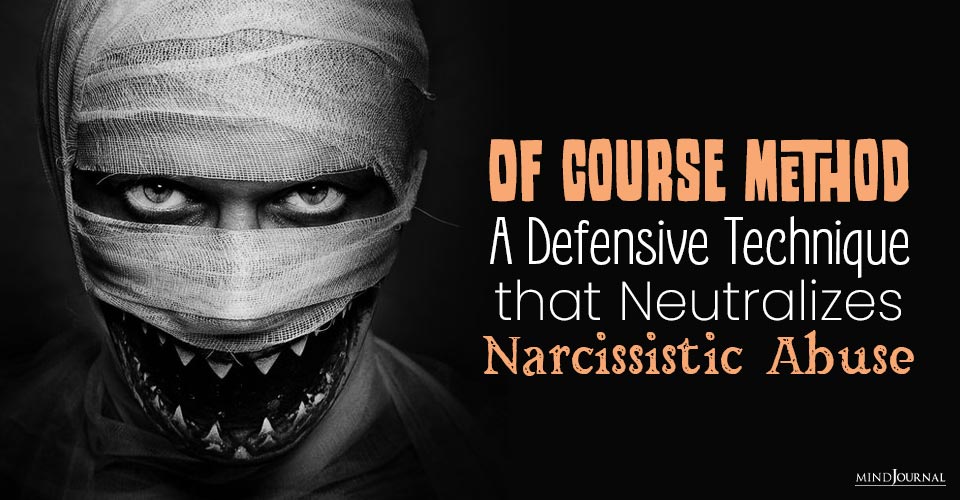The “Of Course Method” can help you tremendously when it comes to dealing with narcissists and their abuse, toxicity and mind games.
Setting boundaries is an important part of all relationships. It becomes even more important—and potentially life-saving—when you are interacting with a pathological narcissist. Those who are Self-Love Deficient (SLD), which is a new term for codependent, need to learn tools and strategies to set boundaries, even to the point of breaking up with someone.
One of the most effective techniques for setting boundaries and breaking free from a pathological narcissist is the “Of Course Method.” It may seem like a simple turn of phrase, but “of course” are two small words that hold huge power.
We’ll look here at what kind of work SLDs need to put in before adding the “Of Course Method” into their toolbox. We’ll also discuss what it looks like in practice and what the benefits of this technique are.
Related: 7 Signs You’re Healing From Narcissistic Abuse
SLDs And Pathological Narcissists: Features Of A Relationship
Before getting into the basics of the “Of Course Method,” we need to look at who it will benefit. This, along with other techniques in the 11-Stage Self-Love Recovery Treatment Program, is designed to bring freedom to those suffering from Self-Love Deficit Disorder (SLDD), and who are in a relationship with a pathological narcissist.
Here are the key features of what a relationship between them may look like:
- A Self-Love Deficient (codependent) has an addiction to a pathological narcissist. Pathological Loneliness is the main withdrawal symptom after the addiction is broken. They are triggered by actions, words, and manipulation from the pathological narcissist, which keeps them powerless in the relationship.
- A pathological narcissist uses control and manipulation to retain power in the relationship. They know what will trigger the person with SLDD and are constantly looking to keep them powerless.
To break free from narcissistic abuse, a person with SLDD must go through several stages and build an arsenal of tools to get there. Without effective tools and strategies, they are not willingly able to break free from their addiction.
The treatment program equips SLDs with tools, techniques, and awareness so that they can intentionally set boundaries and break free from narcissistic abuse. Each new method is another “tool” in your “toolbelt” to draw out when needed.

Building Blocks For Recovery: Where To Start
The 11-Stage Self-Love Recovery Treatment Program is designed to help people overcome SLDD and break free from narcissistic abuse. And while all stages are important for people with SLDD, stages six and seven are particularly important in relation to the “Of Course Method.”
These are fundamental building blocks that will help you get ready to implement the “Of Course Method.”
Here is a summary of the two stages:
- Stage 6: Preparing for the Narcissistic Storm. This is the time when someone with SLDD starts to learn everything they can about the pathological narcissist. You take on the role of the observer, rather than the absorber, to see how they control you and set up the environment to keep you powerless.
- Stage 7: Setting Boundaries in Hostile Environments. At this point, you are ready to take action. Based on the work you’ve already done; you can now effectively set boundaries with the pathological narcissist. This is where the “Of Course Method” comes into action.
By working through the stages, you gain predictive awareness. This is when you understand exactly what is going on with the narcissist, the situation, and your reaction.
Predictive awareness is like a chess player that anticipates a few steps ahead of their opponent. They know the game well enough to be aware of what’s going to happen next.
Predictive awareness goes hand in hand with the “Observe Don’t Absorb Technique”. Because you are working on your awareness, you need to positively dissociate from the encounter and observe what is happening. You can turn on your “Observe Don’t Absorb” mindset by:
- Tapping into your predictive awareness to evaluate common patterns in the situation.
- Identifying the tricks, manipulation, and coercion that the narcissist will try out on you.
- Knowing your own triggers and how you normally react in a situation.
- Avoid reacting in your old ways and remain neutral and detached from the immediate situation.
In short: the narcissist is trying to get you in the “wrestling ring” to fight, but you are just there as a bystander! Using the “Observe Don’t Absorb Technique“, you are remaining on the outside and retaining your power and control of the situation.
Related: Narcissistic Abuse Recovery: Can You Go Back To Being The Person You Were Before Narcissistic Abuse?
The “Of Course Method”
To create and uphold boundaries when dealing with a narcissist, you must actively use the “Observe Don’t Absorb Technique”. Once you are in that headspace, pull out this tool made up of two little words that make a stark difference—of course.
The “Of Course Method” is a way to speak to yourself when engaging with a narcissist. It’s a form of self-talk that affirms what you know and fortifies your ability to observe the situation instead of engaging in it.
The narcissist is always trying to pull you into the “wrestling ring” to fight by using their own methods—which you, of course, have already identified by developing predictive awareness. They are using their weapon of “induced conversation” to pull you into their wrestling ring. Every time they engage with you using this method, you say to yourself: “of course.”
The following is an example how of the “Of Course Method” may sound when applied:
- Of course they would comment on my looks, because they know I’m insecure and will get upset.
- Of course they would try to discredit my viewpoints because it used to make me angry.
- Of course they would laugh at me, knowing that always made me fight back before.
- Of course they would make a comment about that; they know it bothers me.
- Of course they would bring up that situation in the past—I’ve heard them talk about it a million times.
Instead of allowing their comments to trigger you as they have in the past, you calmly repeat “of course” in your head, fortifying you to remain as an observer and not engage in the conversation.
Because you’ve done the work in Stage Six (Preparing for the Narcissistic Storm) you already know all their tricks; it’s not a surprise any longer. This means that you can easily look at the situation while in your “Observe Don’t Absorb” mindset, and say, “of course!”
The Power Of The “Of Course Method” In Practice
These two words are enormously powerful because they affirm what you already know to be true about the narcissist. They allow you to retain your power and not hand it over. Instead of being triggered and activated by what they’re saying, you are remaining in control.
The “Of Course Method” keeps you focused on “Observe Don’t Absorb.” You can remain an outsider to the conversation rather than being pulled into the fight.
In practice, the end goal of the “Of Course Method” is to remove yourself from the situation or end the conversation. It is not to engage in the conversation longer or make them upset, but to get out of the conversation.
Keep in mind that using the “Of Course Method” may make the situation funny. It’s just so obvious what they’re doing, and you might get a laugh out of it! While this shows that you have truly mastered the “Observe Don’t Absorb Technique,” do not laugh at that moment—this will only antagonize them and pull you into their wrestling ring.
The “Of Course Method” is a way to remain in an “Observe mode”, or a healthy dissociative mode—you are physically present, but not allowing your emotions to be triggered by what is going on. This makes it a helpful technique in the heat of the moment.
But beyond that, the “Of Course Method” is helpful by fortifying what you’ve already learned and mastered. This strengthens you to keep fighting to be free from narcissistic abuse. You will become more confident in your ability to predict their next move, but also remain untouched by their manipulation.
You retain your power when you can disengage from a narcissist’s tactics. And it is from a place of power that you set boundaries, leave relationships, and heal yourself. It is from a place of power that you start your journey to Self-Love Abundance.
Don’t hand over your power to a narcissist any longer! Remain as an observer and use the “Of Course Method” to stay grounded in reality and fortified in what you’ve learned and mastered.
Related: 5 Steps To Ignore A Narcissist Who Tries To Hurt You
Conclusion
“Of course” is a simple phrase, hardly remarkable. But these two words are so powerful. When dealing with a pathological narcissist, they help you retain power. They keep you grounded at the moment as an observer, refusing to be triggered by manipulation, coercion, and abuse.
Using the “Of Course Method” will fortify your work to heal from SLDD and break free. For more information about all the stages of self-love recovery, visit our website here. And, if you want to check out the full video on the “Of Course Method,” make sure to visit our YouTube channel.
Want to know more about the of course method narcissistic abuse? Check this video out below!
Check out Ross Rosenberg’s website for more informative articles.
Written By Ross Rosenberg Originally Appeared On Self Love Recovery










Leave a Reply